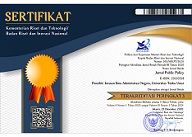Cultivating Tech-Savvy Communities: Revitalizing Digital Literacy in Palembang City
Abstract
This digital literacy is motivated by the COVID-19 Pandemic, people must adapt to new cultures such as work, school, and economic activities through online media. Advances in digital-based information technology cannot be stopped anymore and have become part of today's society's need., For this reason, it is necessary to increase public knowledge in the field of digital literacy. This study aims to determine the implementation of digital literacy programs in the community in Palembang City, among and students. This study uses a qualitative method, using the four pillars of digital literacy, digital skills, digital culture, digital ethics, and digital safety. The theory used in this study is the implementation theory of Grindle, in which determined by the content of the policy and the context of its implementation. The basic idea of this theory is that after the policy is transformed, its implementation takes place. Data analysis in this study used interactive model analysis of qualitative data from Miles and Saldana consisting of Data Condensation, Data Display, and Conclusion drawing or verifications. Based on this research, the four pillars of digital literacy are very important indicators in digital literacy programs. Digital skills are the most basic pillars of interest for the public to learn as basic knowledge of digital literacy. Then followed by digital ethics as further knowledge that needs to be studied so that people know ethics when using digital media. Based on this research, it can be concluded that the implementation of digital literacy will be successful if it is also supported by regulations, rules, and policies for equal distribution of internet networks in all regions of Indonesia, including in the city of Palembang. The government and relevant stakeholders should continuously improve the facilities and infrastructure related to digital literacy, such as expanding stable internet networks and boosting the economy through the development of various online businesses. The shared programs between the government and other communities in educating the masses need to be implied regulary, so that the people, especially in Palembang have an increase of digital literacy as a whole.
Keywords
Full Text:
PDFReferences
Adha, L. A. (2020). Digitalisasi Industri Dan Pengaruhnya Terhadap Ketenagakerjaan Dan Hubungan Kerja Di Indonesia. Journal Kompilasi Hukum, 5(2), 267–298. https://doi.org/10.29303/jkh.v5i2.49
Adikara, G. J., Kurnia, N., Adhrianti, L., Astuty, S., Wijayanto, X. A., Desiana, F., & Astuti, S. I. (2021). Aman bermedia digital. 200.
Agustini, P. (2019). Undang Undang Informasi dan Transaksi Elektronik. KOMINFO. https://aptika.kominfo.go.id/2019/08/undang-undang-ite/
Ahdiat Adi. (2023). Penetrasi Internet di Indonesia Belum Merata sampai 2022. Databoks.Co.Id. https://databoks.katadata.co.id/datapublish/2023/03/09/penetrasi-internet-di-indonesia-belum-merata-sampai-2022
APJII. (2022). APJII di Indonesia Digital Outloook 2022. Buletin APJII. https://apjii.or.id/berita/d/apjii-di-indonesia-digital-outloook-2022_857
Barrutia, J. M., & Echebarria, C. (2021). Effect of the COVID-19 pandemic on public managers’ attitudes toward digital transformation. Technology in Society, 67, 101776. https://doi.org/10.1016/j.techsoc.2021.101776
Blankshain, J. D. (2019). Foreign Policy Decision-Making. In International Relations. Oxford University Press. https://doi.org/10.1093/obo/9780199743292-0269
Büchi, M., Festic, N., & Latzer, M. (2019). Digital Overuse and Subjective Well-Being in a Digitized Society. In Social Media and Society (Vol. 5, Issue 4). https://doi.org/10.1177/2056305119886031
Djalante, R., Lassa, J., Setiamarga, D., Sudjatma, A., Indrawan, M., Haryanto, B., Mahfud, C., Sinapoy, M. S., Djalante, S., Rafliana, I., Gunawan, L. A., Surtiari, G. A. K., & Warsilah, H. (2020). Review and analysis of current responses to COVID-19 in Indonesia: Period of January to March 2020. Progress in Disaster Science, 6, 100091. https://doi.org/10.1016/j.pdisas.2020.100091
Eva, M. (2021). Indeks Keberadaban Digital: Indonesia Terburuk se-Asia Tenggara. VOA Indonesia. https://www.voaindonesia.com/a/indeks-keberadaban-digital-indonesia-terburuk-se-asia-tenggara/5794123.html
Ghulamudin, M. (2021). Analysis of Students’ Parents Consent on Face-to-Face Learning Activities During the Covid-19 Pandemic. JELLE : Journal Of English Literature, Linguistics, and Education, 2(1). https://doi.org/10.31941/jele.v2i1.1429
Grindle, Merile S. (2002). Teori dan Proses Kebijakan Publik. In Teori dan Proses kebijakan Publik. Yogyakarta: Media Presindo.
GÖK UĞUR, H., & HENDEKCİ, A. (2022). Covid-19 Fear and Compliance with Protective Measures of Students Who Continue Face-to-face Education During the Covid-19 Pandemic. Middle Black Sea Journal of Health Science, 8(1), 9–22. https://doi.org/10.19127/mbsjohs.988957
Hahn, K. (2021). Social digitalisation: Persistent transformations beyond digital technology. In Social Digitalisation: Persistent Transformations Beyond Digital Technology. https://doi.org/10.1007/978-3-030-79867-3
Howlett, M. (2015). Policy analytical capacity: The supply and demand for policy analysis in government. Policy and Society, 34(3–4), 173–182. https://doi.org/10.1016/j.polsoc.2015.09.002
Khalifa, S. A. M., Swilam, M. M., Abd El-Wahed, A. A., Du, M., El-Seedi, H. H. R., Kai, G., Masry, S. H. D., Abdel-Daim, M. M., Zou, X., Halabi, M. F., Alsharif, S. M., & El-Seedi, H. R. (2021). Beyond the pandemic: COVID-19 pandemic changed the face of life. International Journal of Environmental Research and Public Health, 18(11), 5645. https://doi.org/10.3390/ijerph18115645
Luqman, M. (2024). 4 Pilar Literasi Digital & Contoh Lengkap - Deepublish. Deepublish. https://pengadaan.penerbitdeepublish.com/pilar-literasi-digital/
May, C. R., Johnson, M., & Finch, T. (2016). Implementation, context and complexity | Implementation Science | Full Text. 11(1–12). https://implementationscience.biomedcentral.com/articles/10.1186/s13012-016-0506-3
Miles, M. B., Huberman, A. M., & Saldaña, J. (2014). Qualitative data analysis: A methods sourcebook. 3rd. Sage Publications, Inc.
Morris, T. H., & Rohs, M. (2021). Digitization bolstering self-directed learning for information literate adults–A systematic review. Computers and Education Open, 2, 100048. https://doi.org/10.1016/j.caeo.2021.100048
Purnama, S., Ulfah, M., Machali, I., Wibowo, A., & Narmaditya, B. S. (2021). Does digital literacy influence students’ online risk? Evidence from Covid-19. Heliyon, 7(6), e07406. https://doi.org/10.1016/j.heliyon.2021.e07406
Rahmah, A. (2015). Digital Literacy Learning System for Indonesian Citizen. Procedia Computer Science, 72, 94–101. https://doi.org/10.1016/j.procs.2015.12.109
Wu, X., Ramesh, M., & Howlett, M. (2015). Policy capacity: A conceptual framework for understanding policy competences and capabilities. Policy and Society, 34(3–4), 165–171. https://doi.org/10.1016/j.polsoc.2015.09.001
DOI: https://doi.org/10.35308/jpp.v10i2.7994
Refbacks
- There are currently no refbacks.
Copyright (c) 2024 Isabella, Alfitri, Ardiyan Saptawan, Nengyanti, Alam Mahadika
p-ISSN: 2477-5738 I e-ISSN: 2502-0528 I DOI: 10.35308
Jl. Alue Peunyareng, Ujong Tanoh Darat, Meureubo, Kabupaten Aceh Barat, Aceh 23681, Indonesia
(0655) 7110535 l +621260313742 l +6285277110911
 is licensed under a Creative Commons Attribution-ShareAlike 4.0 International License
is licensed under a Creative Commons Attribution-ShareAlike 4.0 International License


